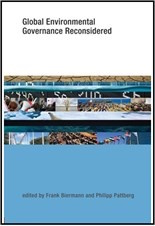Authors
Frank Biermann and Philipp Pattberg (editors)
Publication Year
2012
Source
The MIT Press, Cambridge, Massachusetts
xvi+301 pages
The notion of global governance is widely studied in academia and increasingly relevant to politics and policy making. Yet many of its fundamental elements remain unclear in both theory and practice. This book offers a fresh perspective by analyzing global governance in terms of three major trends, as exemplified by developments in global sustainability governance: the emergence of non-state actors; new mechanisms of transnational cooperation; and increasingly segmented and overlapping layers of authority.
The book, which is the synthesis of a ten-year “Global Governance Project” (2001-2011) directed by Frank Biermann and carried out by thirteen leading European research institutions, first examines new nonstate actors, focusing on international bureaucracies, global corporations, and transnational networks of scientists; then investigates novel mechanisms of global governance, particularly transnational environmental regimes, public-private partnerships, and market-based arrangements; and, finally, looks at fragmentation of authority, both vertically among supranational, international, national, and subnational layers, and horizontally among different parallel rule-making systems.
The implications, potential, and realities of global environmental governance are defining questions for our generation. This book distills key insights from the past and outlines the most important research challenges for the future. As is noted in the Preface “Although the Global Governance Project, in its current form, is coming to an end with this book, its research agenda focusing on new actors in global environmental governance, the relevance of private and public-private mechanisms, and the causes and consequences of horizontal and vertical fragmentation remains important”.
| TABLE OF CONTENTS |
Series Foreword
Preface
List of Acronyms
1. Global Environmental Governance Revisited, Frank Biermann and Philipp Pattberg
Part I: THE NEW ACTORS
2. International Bureaucracies, Stffen Bauer, Steinar Andresen, and Frank Biermann
3. Global Corporations, Kyla Tienhaara, Amandine Orsini, and Robert Falkner
4. Science Network, Aarti Gupta, Steinar Andresen, Bernd Siebenhüner, and Frank Biermann
Part II: THE NEW MECHANISMS
5. Transnational Environmental Regimes, Philipp Pattberg
6. Transnational Public-Private Partnerships, Karin Bäckstrand, Sabine Campe, Sander Chan, Ayşem Mert, and Marco Schäferhoff
7. Transnational Governance Experiments, Harriet Bulkeley, Matthew J. Hoffmann, Stacy D. VanDeveer, and Victoria Milledge
Part III: THE NEW INTERLINKAGES AND FRAGMENTATIONS
8. Horizontal Institutional Interlinkages, Fariborz Zelli, Aarti Gupta, and Harro van Asselt
9. International-Domestic Linkages and Policy Convergence, Per-Olof Busch, Aarti Gupta, and Robert Falkner
10. Regional Governance Arrangements, Tatiana Kluvánková-Oravská and Veronika Chobotová
11. The Changing Role of the State, Daniel Compagnon, Sander Chan, and Ayşem Mert
12 Conclusions
Glossary
Contributors
About the author

Frank Biermann
Professor of Political Science and of En¬vironmental Policy at VU University Amsterdam and Visiting Professor of Earth System Governance at Lund University, Sweden. He is the founder and director of the Global Governance Project. He holds a number of research management positions, including head of the Department of Environmental Policy Analysis at the VU University Amsterdam and director-general of the Netherlands Research School for Socioeconomic and Natural Sciences of the Environment (SENSE).

Philipp Pattberg
Associate Professor of Transnational Governance in the Department of Environmental Policy Analysis, Institute for Environmental Studies, VU University Amsterdam, The Netherlands



